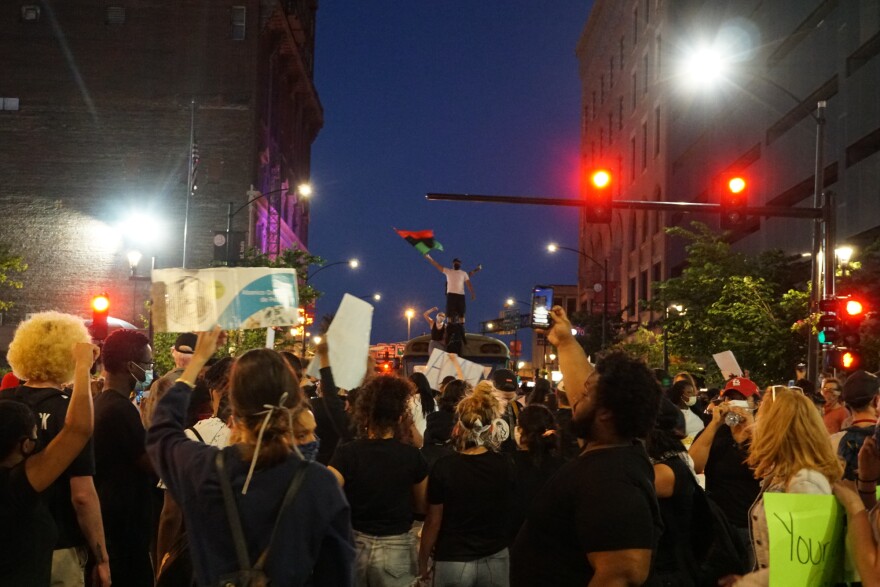A year ago, a Minneapolis police officer killed George Floyd by kneeling on his neck for nearly 10 minutes.
Floyd’s brutal death set off a wave of protests in cities across the nation, including St. Louis, where activists have long demanded that police stop killing Black people.
After Floyd’s death and the trial that convicted former Minneapolis police officer Derek Chauvin of murder, activists for racial justice called for cities to redistribute some money earmarked for police departments to mental health and other community services.
Similar demands are heard in St. Louis, where new leaders are working to change criminal justice policies at the state and local levels, said the Rev. Darryl Gray, a civil rights activist.
“All of this change happened because people took to the streets and we demanded social change and social justice, and not only did we demand it, but the George Floyd movement created the political movement in August in the primary and in November in the general election,” Gray said. “And it shaped local, regional and national politics.
In a recent New York Times essay, Kayla Reed, executive director of Action St. Louis and Blake Strode, executive director of ArchCity Defenders, said activists can harness the power of protests to seek political power.
The political shift helped elect Tishaura Jones, the first African American woman mayor of St. Louis and Rep. Cori Bush, the first Black woman to represent Missouri in Congress. It also established a progressive majority on the St. Louis Board of Aldermen.

“We had to be engaged as related to protest and social activism,” Gray said. “We had to make sure that our engagement resulted into either people getting elected to office that were like-minded to the activists that were the George Floyd activists, police reformers, and that policy began to get adopted within this region.”
Earlier this month, the Missouri legislature passed an extensive criminal justice and law enforcement bill that included creating a use-of-force database to track officers with disciplinary records and prohibit police officers from using chokeholds. Republican Gov. Mike Parson has yet to sign the bill.
Although Missouri is making some changes to overhaul criminal justice, Gray said people should continue to hold their elected officials accountable and force them to make good on their promises when it comes to public safety.
Many St. Louisans have been demanding justice and equity for Black people since then-Ferguson police officer Darren Wilson killed Michael Brown Jr. in 2014.
The demonstrations last summer to save Black lives reinvigorated a movement that has been going on in St. Louis for the past seven years, said David Dwight IV, executive director of Forward Through Ferguson.

He cited “the layering of George Floyd’s murder with the [COVID-19] pandemic and the kind of racist ways that we saw it play out, too, on top of existing health disparities and other barriers to access and the eviction crisis,” saying, “I think those things overlapped and created this opportunity space for a lot of things to become possible that may not have been possible before.”
Forward Through Ferguson, ArchCity Defenders, Action St. Louis and other organizations advocated reallocating $4 million from the St. Louis Metropolitan Police Department budget into community services.
“We were really psyched about that win, as well as a resolution through the [St. Louis] County Council that adopted ours and other community advocates' demands for more transparency and police union contracts because policing contracts often happen behind closed doors and there are huge barriers to accountability when police officers do harm,” Dwight said.
Action St. Louis leaders want people to reflect on the death of Floyd and other people in the region who have lost their lives to police violence. The organization will host a vigil tonight at Poelker Park in downtown St. Louis to allow people to think about those who suffered at the hands of police.
Dwight said people lose their lives every day to police brutality or because of lack of resources in their communities. But he said people have to realize the power they have to make substantial change that could save Black lives.
“I would also encourage people as a reflecting on the anniversary of the murder of George Floyd to think about their power, because every one of us has power and a sphere of influence,” Dwight said. “And it's only through leveraging that power combined with a bold vision that we can actually get to somewhere different."
Follow Andrea on Twitter: @drebjournalist.






